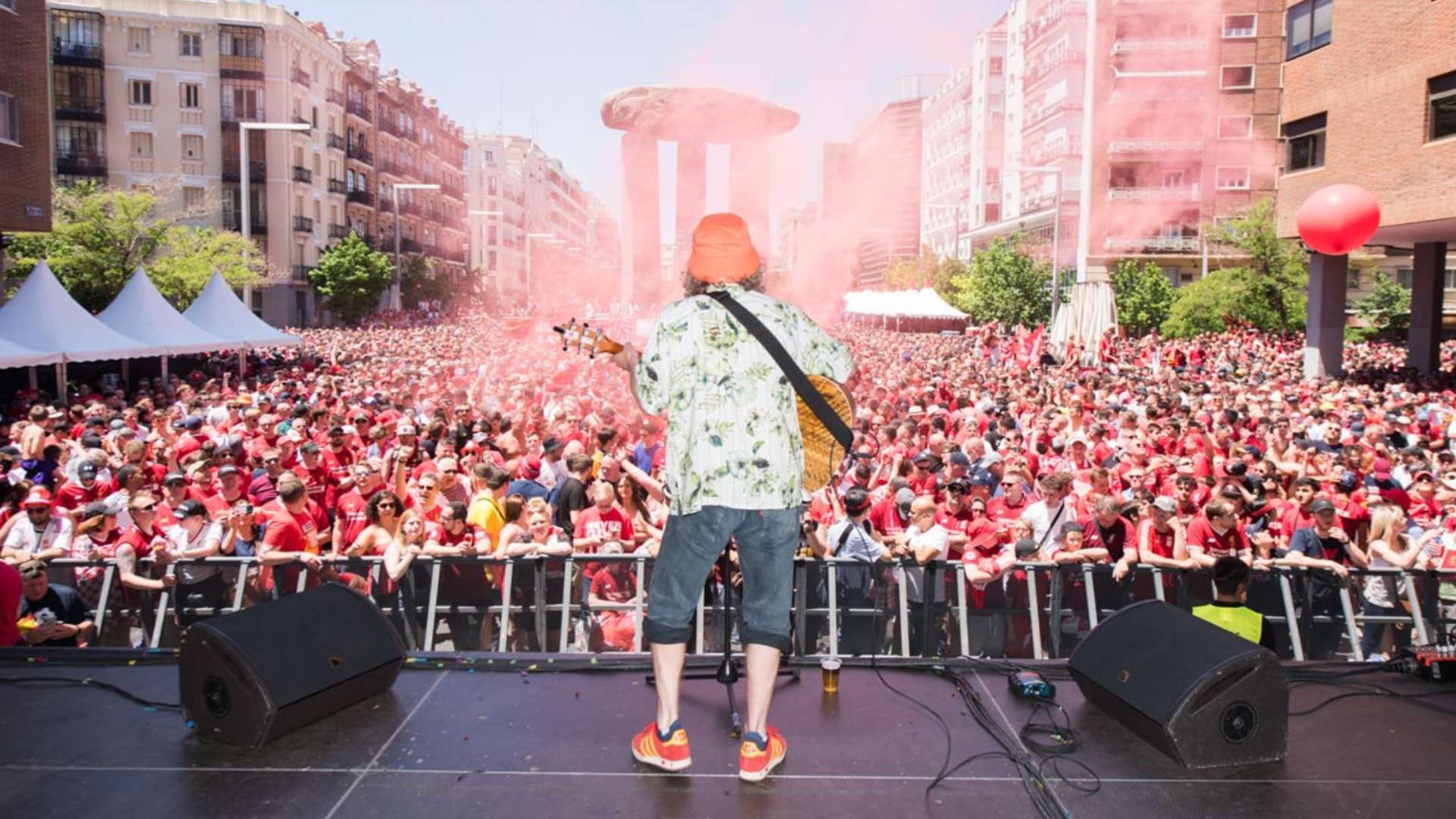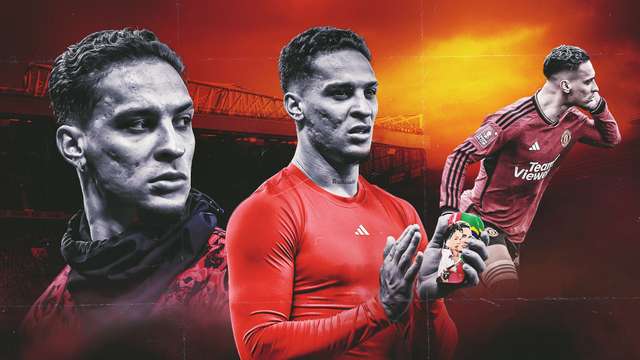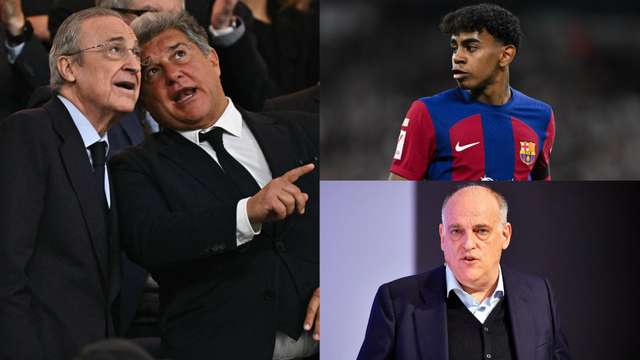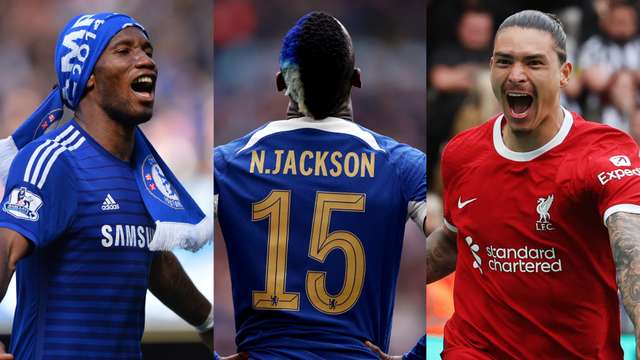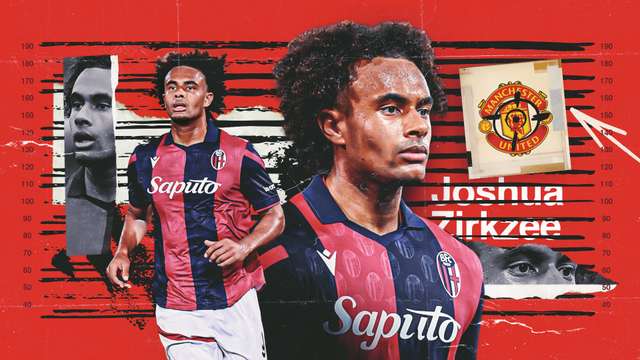The man with the guitar took a deep breath, taking a second to composing himself.
Outside it was bedlam, with more than 50,000 Liverpudlians waiting beneath the searing Spanish sun. Plaza Felipe II, one of Madrid’s biggest and most famous squares, was a sea of red.
For Jamie Webster, this was one of those ‘pinch yourself’ moments. Another one.
The Champions League final was hours away, significant enough in itself for a lifelong Red, but first the 25-year-old electrician from West Derby was about to play the biggest gig of his life.
“Madness!” he tells Goal, reflecting on his hour-long set. “But I knew it would be like that. That’s Liverpool for you.”
Liverpool’s journey over the past few seasons has, naturally, been defined by events on the pitch. Mohamed Salah’s goals, Alisson Becker’s saves, Jurgen Klopp’s smiles and hugs.
Liverpool have a team – and a manager – the envy of Europe, but off the field something equally impressive is happening.
Rarely has there been a better time to be a Kopite.
Webster, Scouse to the core, has become one of the faces (and voices) of the modern Liverpool. He’s the singing spark who gets the party started, whether on Merseyside, in Munich or Madrid.
“People relate to Jamie because he’s authentic,” says Daniel Nicolson, whose BOSS Night events have given Webster a platform allowing him to reach thousands of Liverpool supporters across the world.
“First and foremost, he’s a Liverpool fan, and everyone knows that. He goes everywhere, he's on the coaches and he's in the away ends.
"And when he’s up there on the stage, I think people see themselves in him.”
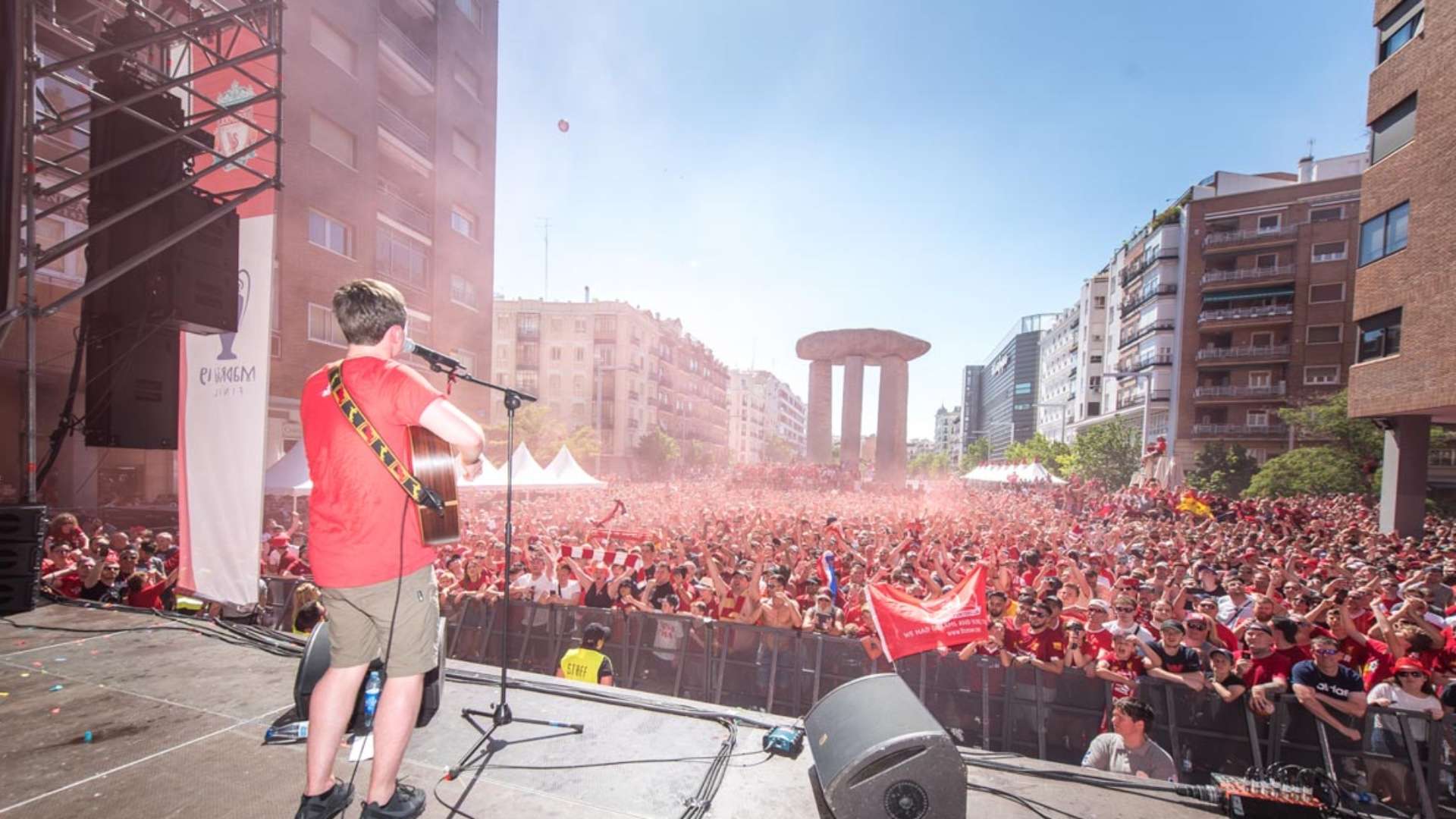
BOSS Night actually began as BOSS Mag, a fanzine edited by Nicolson that launched in October 2007.
“The idea, really, was just to record some of the stories you come across as a supporter, especially on an away day,” Nicolson tells Goal. “It was to be old-school, black and white, cost only a pound, scrappy in parts.
"But the point was to tell the story of what it was like to be a fan at that time – the football, yes, but also the music, the fashion, the culture, the humour.”
Originally, the idea was to cover both Liverpool and Everton, but conversations with Blue-leaning friends proved fruitless. “They laughed at me!” Nicolson says. “They called it ‘Kopite behaviour’.”
BOSS Mag ran for nine years – though only a dozen editions were ever produced – but, in 2012, Nicolson and his pals made the decision to branch out into live events.
BOSS Night was born.
“Looking back, I’d have put more thought into the name,” laughs Nicolson. “But for us, BOSS Mag was as much about the music as the football, so it felt like a natural progression.”
The first gig was held in Liverpool’s Static Gallery, attracting a crowd of around 400. “It was a proper band night, not a Liverpool FC night,” Nicolson says.
That would soon begin to change, as BOSS hit upon the idea of post-match parties, a place for Liverpool fans to go after a game on a Saturday or Sunday.
The nights, held initially at a bar called OSQA near Lime Street station, would quickly snowball. And within a year, they’d feature a young lad called Jamie Webster.
“I had been playing guitar for years,” he remembers. “But, to be honest, I never mentioned it to the lads I would go to the game with. I kept that side separate from the match.”
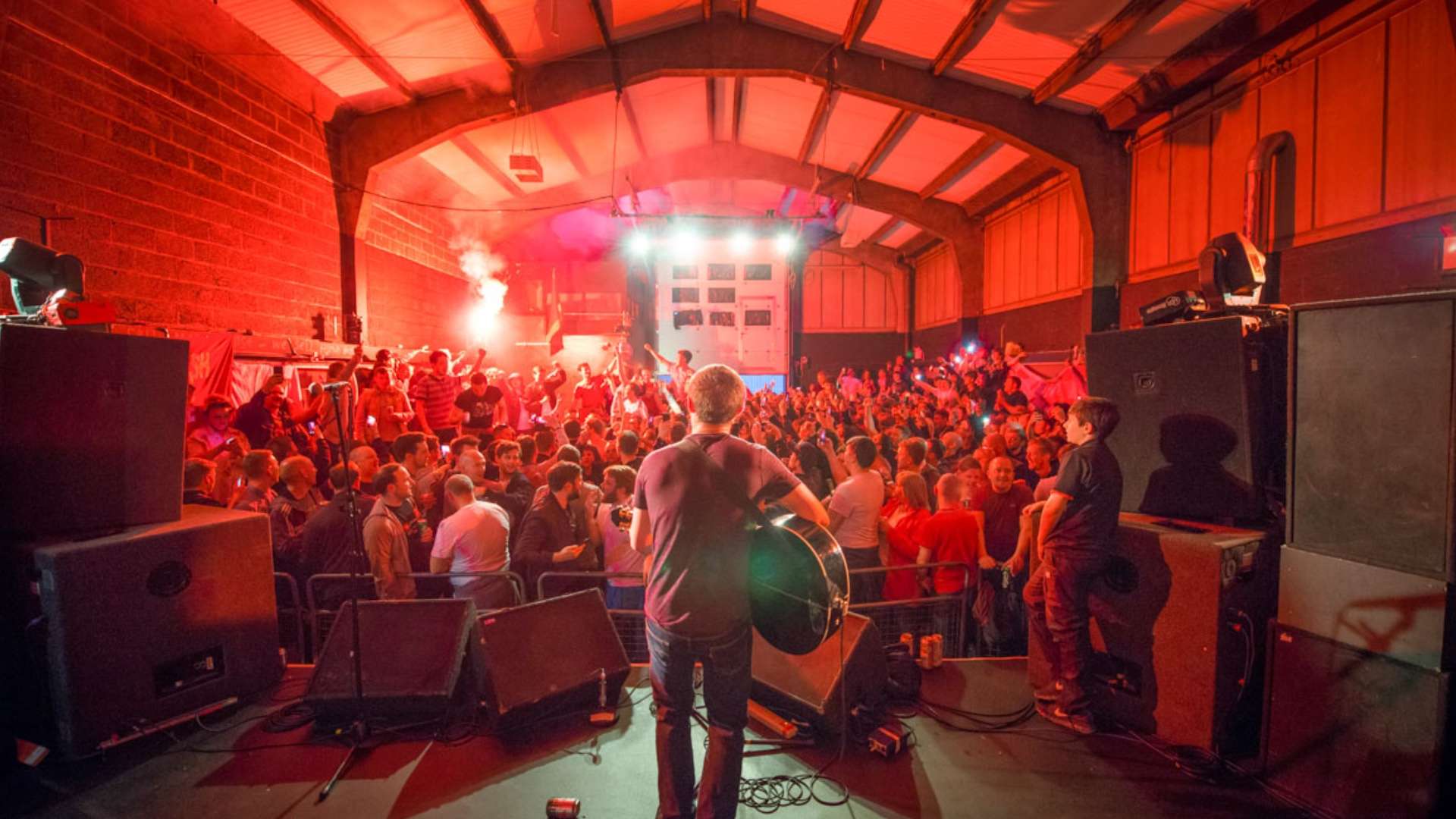 John Johnson
John Johnson
Baby-faced, skin-headed and clad head to toe, perhaps fittingly, in Hugo Boss, he proved an instant hit, and when BOSS moved to a new venue at District, in Liverpool’s Baltic Quarter, Webster’s performances began to take on more of a football feel.
“I remember after one game in the 2013-14 season,” he says. “I was playing ‘Mrs Robinson’ by Simon and Garfunkel. And the next thing the crowd, mostly my mates from the match, are singing ‘Here’s to you, Jordan Henderson’ That’s how that song started."
Others would follow. It was a Webster/BOSS Night session which brought Mohamed Salah’s song – to the tune of James’ ‘Sit Down’ – to prominence.
“I always sing the James song,” says Webster. “I think the lyrics reflect what it’s like to support Liverpool.
“This night there were about 15 of my mates at the front, and when I finished they just carried on singing, ‘Mo Salah, Mo Salah, running down the wing’.
“I got on the guitar and it just went off. The video went everywhere. It was all over social media. That’s where that all started.”
The same can be said for Divock Origi’s tune, an adapted version of Whigfield’s ‘Saturday Night’, concocted by Webster’s inebriated friend at a League Cup tie at Burton and first ‘performed’ after a Merseyside derby win over Everton in 2017. Naturally, it has had a few airings in recent months.
But if there is one song which has come to define Webster’s performances, it is ‘Allez Allez Allez’. It was the soundtrack to Liverpool’s season, the song every player seems to know.
When Alisson visited District for an LFCTV documentary in February, for example, he and Webster performed it together. The video has almost 750,000 views on YouTube.
“The song started In Porto last season (2017-18)," Webster says. "And after the next home game, I played it in the Halfway House near Anfield, and it went massive. I sang it for about 15 minutes straight!
“The next game was at Old Trafford and as I walked onto the terrace, the whole end was singing this song! It was pandemonium, madness. They beat us 2-1, and we just carried on singing. It was one of those ‘what the f***?’ moments, you know?”
That season, of course, would end in Kiev, Webster playing the biggest BOSS Night of his life (to that point anyway) in Shevchenko Park. Liverpool lost the Champions League final to Real Madrid, but nobody who was there will forget how they felt that weekend. "A turning point," Nicolson says.
It is not just the music, of course. The rise of local brands such as Lost Soles, founded by lifelong Liverpool fan John Sutton, and Transalpino, named after the student travel agency which would take Reds fans to European away trips in the 1980s, means there is a distinctive look to travelling Kopites these days.
The T-shirts, the hoodies and the hats are becoming as iconic as the Liver Bird. Transalpino's 'Madrid range', produced for the Champions League final in May, sold out within hours, while another local firm, Hat Scarf or a Badge, has exploded.
“I get sent the videos and the pictures whenever Liverpool play,” says Sutton, who has seen Lost Soles grow from a one-off pop-up store into one of the city’s busiest shops, based in the heart of the Albert Dock.
“In Kiev last year, everywhere you looked were our T-shirts. My head fell off when I saw them all!
“I think Scousers, and in particular Liverpool fans, have always had that desire to be ahead of the curve when it comes to fashion, and it gives me great pride to see our logo travelling across Europe with the Reds. Long may it continue!”
Nicolson's suggestion that Kiev marked a turning point in the relationship between Liverpool and its supporters is an interesting one.
Of course, fans still have issues with their club. Ticketing, naturally, is the biggest and will continue to be so. Recent debates surrounding the club’s auto-cup scheme and over allocations for the Champions League final have ensured the subject remains firmly in the spotlight. Liverpool sources are aware that such an important issue has the ability to undermine the work being done elsewhere within the club, and are keen to maintain a strong dialogue with supporters as they work towards solutions.
But there are signs that those in power at Anfield are beginning to see the benefits of a collaborative relationship, that they both appreciate and understand their fanbase and their idea of culture and identity. "They used to fear fans I think," says Nicolson. "But they didn't need to."
The work of players with local charities – Trent Alexander-Arnold with An Hour for Others, for example, Andy Robertson with Fans Supporting Foodbanks or Virgil van Dijk with the Owen McVeigh Foundation – is significant, keeping them connected to supporters and fostering a sense of belonging within both the club and the city.
Liverpool liaise with supporter groups such as Spirit of Shankly or Spion Kop 1906, who provide many of the iconic flags seen around Anfield and on their travels. The club played a big part in ensuring those flags, for example, made it to the Champions League final.
'Bring Anfield to Madrid," Mohamed Salah had Tweeted. The Egyptian got his wish. Liverpool rejected UEFA's proposal for fans to take part in a choreographed mosaic and flag-waving ceremony prior to the game.
"That's not what our fans are," one club source says. "We wanted it to look and feel like a proper Liverpool end, and it did."
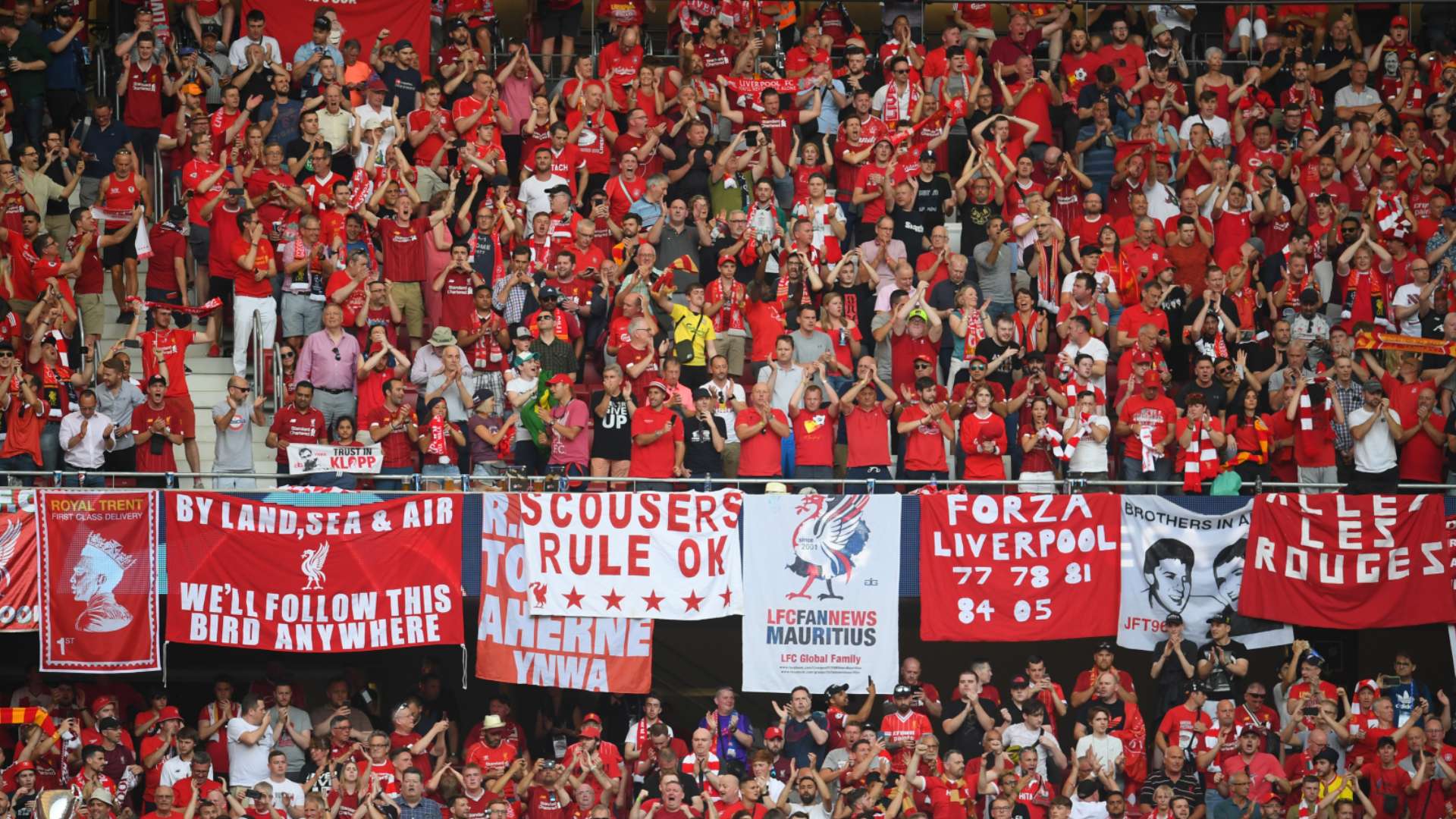 Getty
Getty
Crucially, there are people within the club with experience of supporting Liverpool, and who understand the importance of maintaining and encouraging fans' distinct identities.
“You look within the club now,” says Webster. “People like Tony Barrett [the head of club and supporter liaison], Tom Cassidy and Jane Phillips in the tourism department, the guys at LFCTV like Mark Platt, Mark Volante and Phil Reade – they’re proper supporters, who get what it is to follow Liverpool. That matters.”
Nicolson agrees.
“If you think back to Athens in 2007, coming out of that game you had supporters fighting amongst each other,” he says. “And I think that started years of an ‘us vs them’ feeling, between Scousers and ‘out of towners’.
“Looking back, I think that the ‘locals’ were scared that their culture was being eroded, diluted. And now fast forward 12 years, look how united everyone is. We lose a Champions League final and everyone is singing ‘Allez Allez Allez’!
“Wherever you’re from, you want to be a part of this, you want to sing the songs and wear the T-shirts and wave the flags.
“There is a togetherness among supporters that wasn’t there not so long ago.”
Liverpool are increasingly smart in using that togetherness to good effect. Their marketing slogan 'This Means More', for example, plays on the idea that there is something unique about supporting the club. It attracts a certain level of derision, but to many it feels like an accurate statement.
Outside of the club, the rise of independent fan media such as The Anfield Wrap, Redmen TV, Anfield Index and This is Anfield is there for everyone to see. The Anfield Wrap, which produce daily podcasts on all manner of issues, boast almost 13,000 subscribers while the club has encouraged its players – and Klopp - to engage with such sites. It means supporters are given access that, in the past, was restricted to mainstream or club media.
Club media, of course, can often be seen as sanitised and uncritical, but Liverpool's in-house TV channel has made great strides, and is increasingly willing to tap into what it means to be a supporter – good and bad. Features such as Alisson's singalong with Webster go viral, of course, but LFCTV has also attempted to tackle more serious issues.
Its documentary 'Through the Storm', released last October, examining the impact of mental health issues in football and wider society, and featured the story of former player Jason McAteer and his battle with depressioon. It was a tough, but vital watch.
"It's important that the club can do things like that," says Nicolson. "The reach of Liverpool FC is huge, and sometimes it's easy to forget the impact it can have on people's lives, and the difference it can make."
To finish, a story which sums up Webster’s rise.
It is the early hours of June 2, at Liverpool’s post-Champions League party in the Eurostars hotel in Madrid. Jurgen Klopp, a few beers down but showing no signs of fatigue, is posing for pictures with fans and sponsors.
“I don’t usually go in for that kind of thing,” Webster says. “But this was a special night, so I needed to speak to him!
“I was with my girlfriend, and I just tapped him on the shoulder and said ‘Jurgen, I don’t know what to say, other than thank you.’
“He’s looked at me, gritted his teeth and then slapped me across the face! ‘No Jamie, thank you!’ he said, and then just me a massive hug, proper lifted me off my feet.
“I introduced him to my girlfriend – she must have been wondering what was going on – and he was ‘Hello, Jamie’s girlfriend!” and another massive hug, no slap this time, thankfully!
“To me, that just sums up the last few years. I’ve always been a Liverpool fan, and I always will be. But right now we feel a part of the club."

